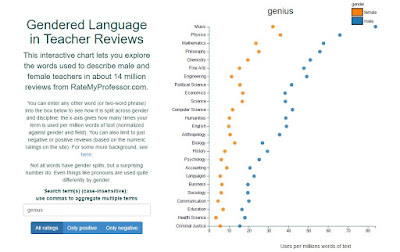Interesting tool here, where you can search for terms in professors' teaching reviews, by discipline and gender.
The gender associations of "genius" with male professors are already fairly well known. Here's how they show in this database:
Apologies for the blurry picture. Click on it to make it clearer!
On the other hand, terms like "mean", "strict", and "unfair" tend to occur more commonly in reviews of female professors. Here's "strict":
How about "sexy"? You might imagine that going either way: Maybe female professors are more frequently rated by their looks. On the other hand, maybe it's "sexier" to be a professor if you're a man. Here how it turns out:
Update, 10:45.
I can't resist adding one more. "Favorite":




7 comments:
Wow. I wish I could find this hilarious, but I just find it really depressing.
I agree, Ina. I couldn't quite bring myself to close with one of the jokes that, if the matter weren't so serious, it would be tempting to make.
Not sure exactly what the take-away is.
You achieve the exact opposite results when you use "idiot" or "arrogant"
Pilot Guy: Nice point about "idiot" and "arrogant". "Arrogant" is especially skewed toward men.
As for the take-home message, I think these results fit with some other patterns I've seen: Sara-Jane Leslie on "genius" and sexism in academia, results about bias in teaching evaluations, and how intellectual skills seem to have a different relationship to sexual attractiveness for men and women. That's why I chose those three issues. But I'm sure there's lots of other stuff going on too, as your examples suggest.
There's a lot of very puzzling stuff in this data pool. "Homework" is female-biased across the board, while "test" is male-biased. "The" is (a little) male-biased for almost every discipline. In philosophy, "clever", "smart", and "brilliant" are all male-biased, but the male-female gap is closing along that sequence (which I'd take as a strength-increasing sequence), only to open up again at "genius". "Stupid", "dumb", and "idiot" are all male-biased. "Helpful" and "fair" are female-biased, as are "unhelpful" and "unfair". "Boring" and "interesting" are both male-biased. And perhaps not so surprisingly, "argue" appears vastly more in philosophy reviews than in any other discipline.
Thanks, Josh! Quite a tangled mess of data, as your and Pilot Guy's comments help us see. I'd be careful reading too many into any of these results, except where there's convergent evidence of other types with which it fits.
One source of caution is that we don't know how the words were used. For example, "fair" could be part of "her grading wasn't fair" and "stupid" could be part of "he treated students like they were stupid".
Thanks for this post. Does anyone have any information on whether hiring committees take into account the research about bias in teaching evaluations when they look at an applicant's teaching dossier?
Post a Comment